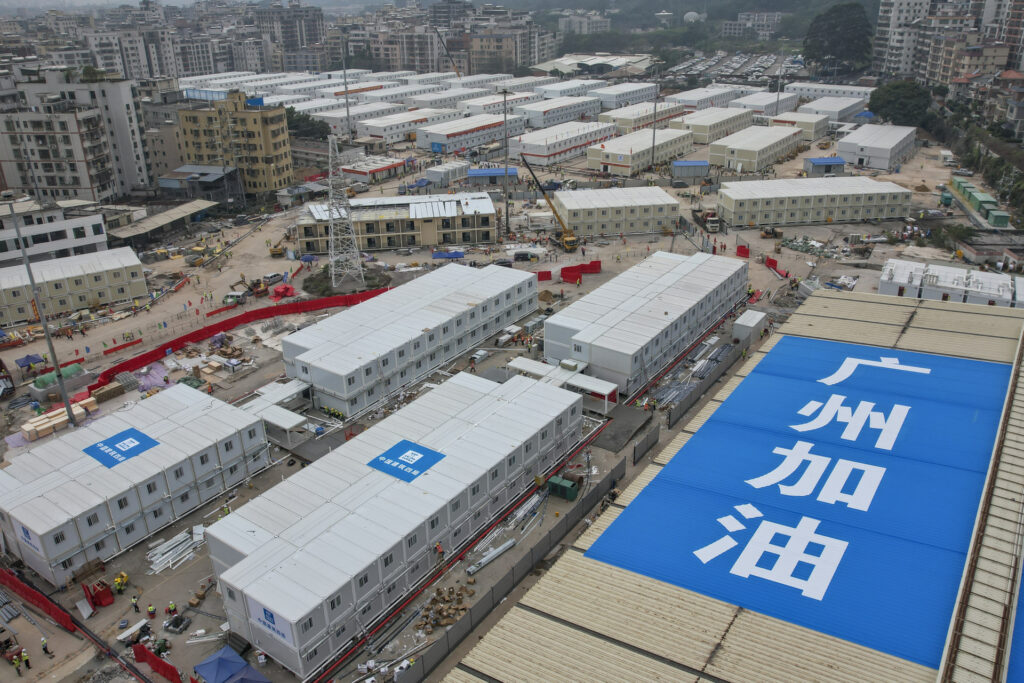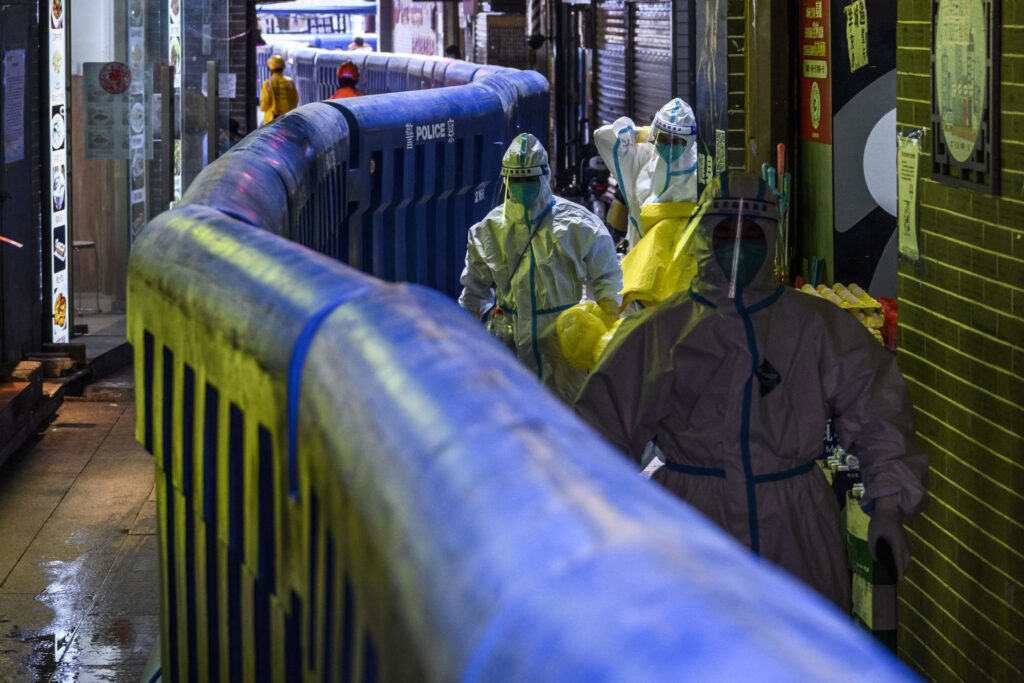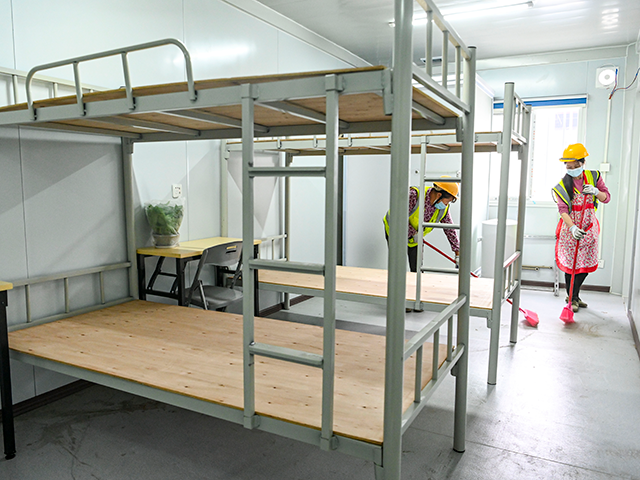China’s state-run Global Times newspaper reported on Thursday that the southern metropolis of Guangzhou was planning on expanding its repressive coronavirus quarantine camps by tens of thousands of beds, presumably to force more citizens into the facilities and out of their homes.
Chinese officials have spent much of the past month touting alleged reforms to the communist government’s brutal “zero-Covid” policy, which consists largely of locking down the populations of entire cities and leaving residents without food or medicine. The Communist Party has been imposing such lockdowns since the pandemic began in central Wuhan, Hubei province, in early 2020, going as far as to weld people shut in their homes. The true death toll from the lockdowns may never be known given the Communist Party’s heavy censorship, but the Party’s media arms have admitted to a steady stream of harrowing deaths in the past two years of individuals refused medical care at local hospitals or dying from lack of access to basic medical products or health care.
This week, the Communist Party debuted a series of 20 “reforms” to the “zero-Covid” policy that shortened quarantine times and loosened testing schedules but did not address apprehension of individuals suspected of carrying Chinese coronavirus or limit police action against them. Chinese media outlets insisted that the “reforms” were intended to perfect an already successful system, not to give up or “lie flat” against the threat the virus allegedly presents.
China is the last major government to insist on widespread lockdowns to contain the virus. The World Health Organization (W.H.O.) has advised against lockdowns, going so far as to criticize China, but it has not managed to convince dictator Xi Jinping to change his policies. The Communist regime has abandoned announcing city-wide lockdowns, however, out of an apparent fear of scaring off foreign investors. Lockdowns have caused significant strain on China’s economy as they artificially obliterate demand for key goods and have shut down critical manufacturing facilities.

Aerial view of the construction site of a makeshift hospital for coronavirus patients in Baiyun district on November 18, 2022 in Guangzhou, Guangdong Province of China. (Chen Jimin/China News Service via Getty Images)
The lockdowns have made violent outbursts of civil unrest a regular sight in the previously tightly-controlled communist dictatorship. Last week, workers in Guangzhou revolted, tearing down lockdown barricades and flipping over police cars.
Chinese officials insist that Guangzhou is currently undergoing a severe coronavirus outbreak but have not announced a total lockdown. Instead, the city appears to be preparing to haul tens of thousands of people into tightly-controlled quarantine camps.

Medical staff with protective clothing are seen inside the fence on November 18, 2022 in Guangzhou, Guangdong province of China. According to official news, the epidemic situation in Guangzhou is at a critical stage of disposal, and the number of infected people is rising. (Stringer/Anadolu Agency via Getty Images)
Guangzhou “plans to add more than 240,000 beds in makeshift hospitals and centralized quarantine zones to prepare for [Chinese coronavirus] patients’ accommodation as it has reported more than 46,000 cases since November,” the Global Times reported. “Guangzhou is making all-out efforts to speed up the construction of makeshift hospitals and centralized quarantine zones with a plan to build a total of 246,407 beds, said Wang Bosen, spokesperson for the Guangzhou Municipal government, on Thursday.”
#Guangzhou in S China's Guangdong Province plans to build more than 240,000 beds in makeshift hospitals and centralized quarantine zones to prepare for #COVID19 patients' accommodation as it has reported more than 46,000 cases since November. https://t.co/Cu2S97Z71K
— Global Times (@globaltimesnews) November 17, 2022
The district of Haizhu in Guangzhou, which in total is home to about 15 million people, is at press time the most restricted. Haizhu is where the riot against police occurred this week. According to officials there, nearly 100,000 people in the neighborhood have been forced into quarantine camps.
Large as that number is, the South China Morning Post, citing locals trapped in Haizhu, found evidence that the government is struggling to contain all the people it has identified as coronavirus threats. One family in the neighborhood told the Post that they all suddenly received “red codes” – every Chinese citizen must download an application that allows the regime to impose isolation on them by switching their coronavirus status from “green” to “red” – but Communist Party officials in hazmat suits had yet to visit to abduct them into quarantine camps.
“There may be too many people given red codes and yellow codes, and local health authorities and volunteers are already too busy to deal with our case,” one family member told the Hong Kong newspaper.
Issuing a wide array of “red” codes allows the government to essentially lock down entire neighborhoods without announcing a sprawling lockdown, so as to not scare away foreign investment.
The Morning Post noted that Haizhu was a densely populated neighborhood home to a large percentage of workers who moved there from other parts of the country, particularly Hubei, the origin province of the virus where Wuhan is located.
“All kinds of rumors, such as suicide, looting and protests are circulating among them,” one source in Haizhu told the Morning Post.
These workers were reportedly behind the riot in the neighborhood on Monday night. Local residents appeared to engage in group brawls against government workers in hazmat suits, tear down barricades, and flip over a police car.
【广州封城酿大规模暴动】
周一晚广州多处民众示威抗议封城措施过严,包括海珠区大塘、中大布匹市场附近的康乐村、天河区棠厦小区等都爆发示威。有工厂工人不满物资短缺,冲破防线推翻警车。#广州封城 #暴动 pic.twitter.com/2MoSvz2odG— 自由亚洲电台 (@RFA_Chinese) November 14, 2022
Following the riot, authorities announced they would redirect more of their coronavirus policy efforts into Haizhu, essentially loosening restrictions elsewhere in Guangzhou.
“Officials in Guangzhou, also the hardest-hit city in the province, said on Wednesday to optimize nucleic acid test according to the new measures, and focus test resources on the most severe Haizhu district and other high-risk areas,” the Global Times observed.
Elsewhere in Guangzhou, however, evidence has begun surfacing of authorities using violence to subdue the population even outside of lockdowns. A video shared widely, and then censored, on Chinese social media on Thursday appeared to show an assault by public health workers at a takeout restaurant, attacking and typing up two women for not wearing a sanitary mask. The men tying the women up and thrashing them onto the ground can be seen wearing blue hazmat suits, the standard uniform for government pandemic workers.
“My friend got a bit emotional, they put us down even though we did not have any physical confrontation [with them] … my friend’s clothes were also torn apart,” one of the women later wrote in a post on the censored Chinese government social media site Weibo. “They didn’t allow us to call the police … they were violent to us before even checking our health code.”
The increased investment in quarantine camps and use of the coronavirus color app to de facto lock people down has been accompanied by remarks on the part of Chinese officials suggesting, but not promising, and end to full-scale lockdowns.
“We firmly oppose two inappropriate approaches. One is the block-it-off approach, which resorts to excessive control measures, and the other is the let-it-go approach, which is irresponsible,” a spokesperson for the Chinese National Health Commission (NHC), Mi Feng, said on Thursday.
Another Chinese government public health expert, Wang Liping from the Chinese Center for Disease Control (CDC), emphasized on Thursday that reforms to “zero-Covid” would not necessarily mean an end to lockdowns.
“More targeted and effective epidemiological investigation and risk assessment will be needed to identify high-risk areas,” Wang said, according to the state news outlet Xinhua. “She said although closed management will still operate in high-risk areas, vulnerable groups will be attended to, and their daily necessities and medical supplies ensured.”

COMMENTS
Please let us know if you're having issues with commenting.